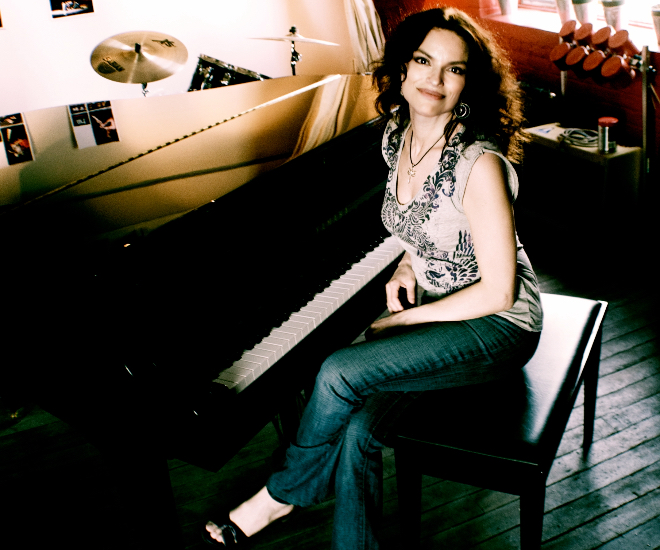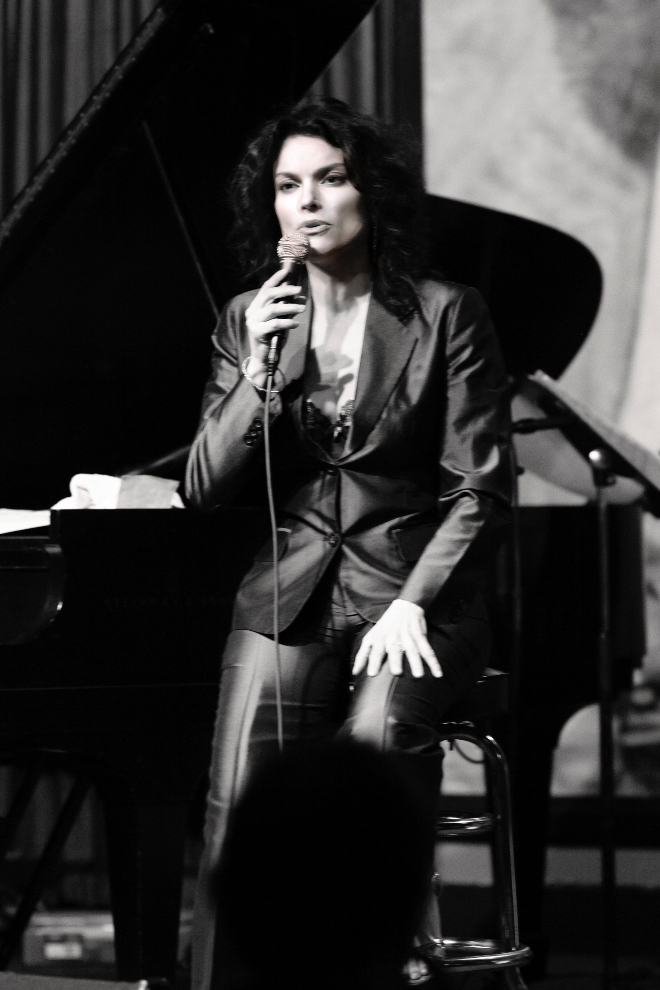[ad_1]

The Jazz Association (Singapore) charity was established in September 2016 to promote the participation, engagement and excellence of jazz in Singapore. Every year since, the association has hosted the JASS Benefit Gala. This year’s headliner is two-time Grammy Nominee, Roberta Gambarini who will be performing alongside Jazz Association Singapore Orchestra (JASSO) led by Maestro Jeremy Monteiro. A talented performer with a powerful voice to boot (talents of her clear alto were already highlighted by the age of 12), Roberta’s 2008 duet album titled You Are There with pianist Hank Jones cemented her status as one of the most celebrated jazz performers in the 21st century. Gambarini sits down with LUXUO to discuss her career highlights, the shifts she’s witnessed within the Jazz industry and her future goals ahead of her performance at this year’s Jazz Association (Singapore) Gala.
You have performed at major concert halls and festivals around the world. It must be exciting to be performing in Singapore, how does it differ from other cities you have appeared at? Do you have a favourite city?
Singapore is one of my favourite places in the world for performing and visiting. I have been here many times through the years, and every time it’s been like falling in love again: I am awed at the architecture, the rich diversity of its cultures, and the warmth of the audiences. My mentor James Moody, decades ago before my first trip, spoke to me enthusiastically about Singapore, I still remember his exact words: “You’ll be so impressed by Singapore… get ready for something amazing!” …and he was right!
Do you have any expectations about working with Jazz Association (Singapore) (JASS) Benefit Gala for the first time?
Working with the Jazz Association (Singapore) (JASS) is a great honour for me, and I am anticipating having a wonderful musical experience singing at the Gala, and working with JASS.
What are your thoughts on the jazz music industry today and has it evolved much from when you first started your journey in jazz music?
The jazz industry, as many other industries, has changed significantly in the last years. I would say that the crisis of CD sales and of the record company businesses has given rise to the phenomenon of streaming, which has changed the landscape and the modalities of fruition of music. The overwhelming importance of social media has also been a key factor in this change.

There has been a lot of discussion lately regarding the use of digital devices by the audience during an on-stage performance, what is your take on recording of a live performance? Do you personally take offence that the audience is distracted by their digital devices, for example taking a selfie, during your performance?
Social media are now the primary medium that allows an artist to interact with his/her audience. I am not at all displeased when people in the audience film parts of the concert or take pictures, provided it is done without flash cameras, because abrupt bright flash lights can be startling to a performer. I consider it a sign of appreciation when listeners share images from my concerts on social media.
Do you think social media platforms like TikTok and Instagram are good mediums to showcase one’s talent in today’s digital era?
Social media platforms such as Tik Tok and Instagram are a wonderful way for an artist to have direct interaction with the audience. But there is a danger ingrained in the structure of social media platforms: the video snippets of performances posted are short. A musical interpretation as an artistic form is a kind of storytelling, and storytelling requires time and attention on the part of both the performer and the listener. In order to make sense at all, it needs to be a very deep and intimate experience. So far, the structure of social media platforms has encouraged the sharing of small snippets, which in the current general anxiety to “grab attention” end up being snippets of acrobatics or features meant to quickly grab the viewer’s attention. So the danger we are experiencing now on social media is to have a platform media that is flooded with small and superficial pieces of a performance, furthermore shortening the attention span of the listener, and taking the public further away from music as an art.

You grew up in Turin and worked extensively in Milan throughout your twenties, could you tell us more about your formative or pivotal moments as a musician during your life in Italy?
My formative years in Milan were very intense musically, but also very hard. At the time a jazz musical education was not yet available, and there were colossal prejudices against the fact that a girl could be a jazz performer and leader. Financial hardship coupled with dealing with prejudice taught me to trust my own intuition, have strength in my own choices, and fight for what I believe in.
Having lived in the United States, growing up in Turin and working extensively in Milan, does the city you are in affect the inspiration behind your music?
I moved to the US after a decade of concerts (I started performing jazz very young, at age 17), a decade when I studied music privately (classical composition), and taught myself the fundamentals of jazz piano and improvisation. When I moved to the US, I won an Artist Diploma scholarship at the New England Conservatory, but I was almost right away drawn in the jazz community of New York when Jimmy Heath, Billy Higgins, Curtis Fuller and many other Greats invited me to perform with their groups. So, I left Boston and the New England after less than a year, and moved to NYC. Since 1998, my education owes everything to the teachings of Giants such as James Moody, Clark Terry, Hank Jones, Benny Carter and the Greats I mentioned before. It was a thorough and deep education that happened on stage and off. As far as inspiration, every City and every place provides some. I find a lot of inspiration in the natural world, I make a point of walking in the nature every day, even in NYC where we have many beautiful parks.
Is there a dream city you hope to take the stage on?
I have played in most of the major cities in the world, but there are a few that I haven’t reached yet — one is Ulan-Bator in Mongolia, and another is the Amazonian city of Manaus.
Was there another artist that inspired you or that you looked up to?
There are so many artists that I look up to, the list is so huge, I will try to name just a few — Louis Armstrong, Dizzy Gillespie, Duke Ellington, Charlie Parker, Wayne Shorter, Maria Callas, Montserrat Caballe, Art Tatum, Sarah Vaughan, Carmen Mc Rae, Nat King Cole, Billie Holiday and Anita O’Day.

You have two Grammy-nominated albums and are internationally regarded as a renowned jazz musician, what has been a career highlight for you thus far and what’s the next goal for you?
Awards are wonderful, and they definitely help one’s career. My primary goal now is to bring into reality a series of projects that for many reasons (the pandemic, some serious problems in the health of some loved ones) have had to be delayed. Those projects will come out in 2024, they include an album with the Tuscan Symphony Orchestra, a duo album with piano great Cyrus Chestnut, a new album with many other musical guests, and a project with Argentinian pianist Pablo Ziegler (Astor Piazzolla’s pianist of many years) which fuses Jazz with Nuevo Tango. I am doing a lot of lyrics writing these days, but in the future, I intend to focus much more on composing and arranging.
What was your experience like working with Singaporean pianist Jeremy Monteiro?
The great Jeremy Monteiro was introduced to me by my mentor, the late Jazz Master James Moody, who held him in great esteem. I am really happy that this encountered happened, because singing with Jeremy Monteiro has been a great experience ever since, and a source of wonderful inspiration and fellowship.

You will be holding masterclasses in Singapore in September 2023. What can we expect from them?
I am very devoted to teaching as a mean to share with young musicians the knowledge that the Greats were so generous to share with me. I am really looking forward to the Singapore master classes. In teaching, I also feel very inspired by the drive and dedication that I see in musicians all over the world, it is a sign that jazz is very much alive and thriving.
Finally, what words of wisdom would you like to impart to young artists who want to break into the music and jazz industry?
There is a phrase that the great Roy Hargrove used to say to young musicians: “Take care of the music, and the music will take care of you”. I think that this is the best possible advice that can be given to any musician, young or not. The music business changes over the years along with the societal changes, but music is a universal language that belongs to the spiritual realm, and the primary focus should always be kept on it. With music first in mind, then one can and must navigate these challenging times which ask for a lot of patience, endurance and resilience.
This year’s Jazz Association (Singapore) Gala will be held on 2 September 2023, at Shangri-La Hotel Singapore. Click here to find out more.
For more on the latest in music and entertainment, click here.
[ad_2]